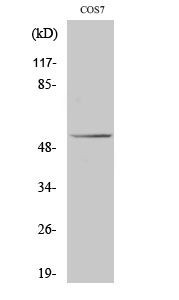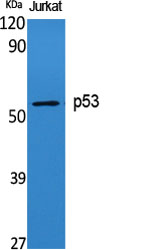

| WB | 咨询技术 | Human,Mouse,Rat |
| IF | 咨询技术 | Human,Mouse,Rat |
| IHC | 1/50-1/100 | Human,Mouse,Rat |
| ICC | 1/50-1/200 | Human,Mouse,Rat |
| FCM | 咨询技术 | Human,Mouse,Rat |
| Elisa | 1/10000 | Human,Mouse,Rat |
| Aliases | TP53; P53; Cellular tumor antigen p53; Antigen NY-CO-13; Phosphoprotein p53; Tumor suppressor p53 |
| Entrez GeneID | 7157 |
| WB Predicted band size | Calculated MW: 44 kDa; Observed MW: 53 kDa |
| Host/Isotype | Rabbit IgG |
| Antibody Type | Primary antibody |
| Storage | Store at 4°C short term. Aliquot and store at -20°C long term. Avoid freeze/thaw cycles. |
| Species Reactivity | Human,Mouse,Rat,Monkey |
| Immunogen | The antiserum was produced against synthesized peptide derived from human p53. AA range:10-59 |
| Formulation | Purified antibody in PBS with 0.05% sodium azide,0.5%BSA and 50% glycerol. |
+ +
以下是3条关于p53抗体的参考文献示例(注:以下为模拟摘要,实际文献请通过学术数据库检索):
1. **"Comparative analysis of p53 antibody specificity in human cancers"**
- **作者**: Smith J, et al.
- **摘要**: 本研究比较了多种商品化p53抗体(如DO-1、PAb1801)在免疫组化(IHC)和Western blot中的特异性,发现不同抗体对突变型与野生型p53的识别存在显著差异,提示抗体选择需结合实验目的。
2. **"p53 immunohistochemistry as a prognostic marker in colorectal cancer"**
- **作者**: Lee S, Kim H.
- **摘要**: 通过分析500例结直肠癌样本,验证了p53抗体(克隆号BP53-11)在免疫组化中的表达与患者预后的相关性,表明p53过表达与化疗耐药性显著相关。
3. **"Epitope mapping of anti-p53 antibodies reveals functional diversity"**
- **作者**: Müller PA, Vousden KH.
- **摘要**: 利用表位定位技术揭示了不同p53抗体的结合区域(如N端或C端结构域),并探讨了这些差异如何影响其在p53功能研究(如细胞周期调控和凋亡)中的应用。
建议通过PubMed或Google Scholar搜索关键词“p53 antibody specificity”、“p53 immunohistochemistry”或“p53 antibody validation”获取最新文献。
The p53 antibody is a crucial tool in cancer research and diagnostics, targeting the p53 protein encoded by the TP53 tumor suppressor gene. p53 plays a pivotal role in maintaining genomic stability by regulating cell cycle arrest, DNA repair, apoptosis, and senescence in response to cellular stress. Mutations in TP53 occur in over 50% of human cancers, often leading to the accumulation of dysfunctional p53 protein, which loses tumor-suppressive activity and may acquire oncogenic properties.
p53 antibodies are widely used to detect p53 protein expression and localization in tissues or cell lines via techniques like immunohistochemistry (IHC), Western blotting, or immunofluorescence. In cancer diagnostics, p53 immunostaining helps identify TP53 mutations, as mutant p53 proteins frequently exhibit abnormal stabilization and nuclear accumulation compared to the rapidly degraded wild-type protein. However, results require careful interpretation, as not all mutations lead to protein over_expression (e.g., truncating mutations may yield undetectable p53).
Common p53 antibody clones, such as DO-7 and PAb1801. recognize specific epitopes in the N-terminal or C-terminal regions. Their applications extend to studying p53 signaling pathways, evaluating therapeutic responses, and assessing cancer prognosis. Wild-type p53 expression is associated with better treatment outcomes in some cancers, while mutant p53 correlates with aggressiveness and drug resistance. Despite challenges in specificity and standardization, p53 antibodies remain indispensable for understanding tumor biology and developing targeted therapies.
×